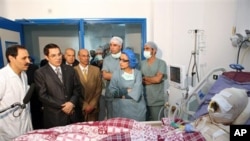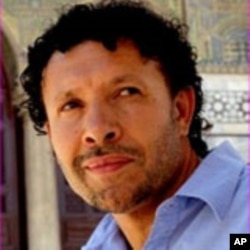It has been two weeks since a young man named Mohamed Bouazizi doused himself in gasoline and set himself on fire in the southern Tunisian city of Sidi Bouzid. This, after police confiscated his market stall, the sole source of income for Bouazizi and his family. The incident sparked anti-government protests and clashes with police across the country. It has also highlighted the growing problem of unemployment in Tunisia, which the World Bank estimates at just under 15 percent, more than double the 6.4 percent rate for other middle income countries.
Recent university graduates are among those most affected. The World Bank says 46 percent of educated youths are still unemployed a year and a half after graduating. Dr. Larbi Sadiki, a senior lecturer in Middle East politics at Britain’s University of Exeter and author of The Search for Arab Democracy: Discourses and Counter-Discourse, told VOA’s Cecily Hilleary he believes the unrest signals that Tunisians are beginning to lose their fear of the government of President Zine el Abidine Ben Ali.
|
Listen to the full interview with Larbi Sadiki:
|
Hilleary: The protests coincide with the release of WikiLeaks about Tunisia diplomatic cables which, among other things, describe an excess of wealth in the presidential family. Is there a correlation?
Sadiki: I think the WikiLeaks moment is an important moment in that it brought to the fore what people have already suspected about corruption within the ruling family in Tunisia.
But I think essentially the protest has been sparked by disaffection. People basically need bread. They need employment. It raises questions about the kind of education Tunisia has got in place; about mal-distribution, about the “slicing of the cake,” as it were - who’s getting what, where, in Tunisia.
Hilleary: And who is getting “what, where?”
Sadiki: That is really the question. I think historically, the South has been neglected. And this is not uniquely, to be fair to [President Zine El Abidine] Ben Ali and his people, the mistake of current regime. From the time of independence, if you take, for instance, the example of central phosphates basin towns: There is lots of production of phosphates. Phosphates were basically sold in the international market.
But the huge financial outlays were not directed for development within those areas. They were directed to development in the coastal areas in the North. That created a huge gap between North and South. You know the cliché “North-South divide” is really nicely mapped out in Tunisia…and the government has not really done much to level the playing field.
Hilleary: Unemployment is a tremendous problem in Tunisia. The World Bank sets it at around 15 percent overall and higher among youth. Are these figures accurate?
Sadiki: I think in some places, it could probably be as much as much as 30, 35 percent in the South, where people really have got nothing. Of course, Tunisia has invested so much in tourism, but tourism today actually is only partly Tunisian-owned, and I think this is a big problem. The [bulk] of the profits [does] not stay in Tunisia. They create some employment - there’s lots of cheap labor, but there is not actually reinvestment of the proceeds from tourism into Tunisia to create more jobs for the youth.
And there’s also the educational system, …if you have 70 to 85 thousand graduates every year from different universities - highly skilled labor - but there’s no labor market to absorb these huge numbers.
Hilleary: Do you see President Ben Ali weakening?
Sadiki: Definitely. There is an amazing image and for me, this is the picture of 2010 in Tunisia: [President Zine El Abidine] Ben Ali visiting [Mohamed] Bouazizi in a Tunis hospital - the young man who doused himself in petrol, who sparked the riots.
And it was really a powerful moment, because here we have a patient, a man basically bandaged, probably dying - we don’t really know yet; he’s seriously burned and the president’s looking at him. I mean, I just feel the president is really looking at Tunisia, Tunisian society. It’s tempting to say the caption for this, “Who is the patient?” Is it the regime, the body politic of Tunisia? Or is it actually the victim, Bouazizi? It’s an incredible moment.





